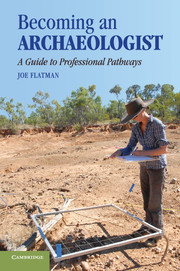Book contents
- Frontmatter
- Contents
- Tables and Figures
- Preface and Acknowledgments
- Introduction
- One What Is – and Isn't – Archaeology?
- Two Skills and Training
- Three Cultural Resource Management
- Four Academia
- Five Local Government
- Six Central Government
- Seven Public and Community Archaeology
- Conclusion
- Appendix 1 Useful Websites
- Appendix 2 Glossaries
- Appendix 3 Suggested Equipment to Take on an Archaeological Project
- References
- Index
Five - Local Government
Published online by Cambridge University Press: 05 June 2012
- Frontmatter
- Contents
- Tables and Figures
- Preface and Acknowledgments
- Introduction
- One What Is – and Isn't – Archaeology?
- Two Skills and Training
- Three Cultural Resource Management
- Four Academia
- Five Local Government
- Six Central Government
- Seven Public and Community Archaeology
- Conclusion
- Appendix 1 Useful Websites
- Appendix 2 Glossaries
- Appendix 3 Suggested Equipment to Take on an Archaeological Project
- References
- Index
Summary
Introduction
Mention “local government” to most people and the mental picture conjured up is unlikely to be very archaeological. Local government means, at best, talk of the school system and municipal facilities such as public parks and recreational facilities; at worst, waste collection and petty politics. Indiana Jones it is not. Many people, including many academic archaeologists, remain largely oblivious to the existence and important role of archaeologists and related heritage professionals in the employ of local government. Local laws protect a vast number of archaeological as well as wider historic sites. Local taxes pay directly for a large amount of archaeology to be explored, understood, publicized – and, most important, protected. Local government archaeologists also represent an incredible pool of expert, locally based knowledge that is easy for the general public to call on, a more immediate and often less intimidating face of the archaeological community than CRM and academic archaeologists alike.
Archaeologists are employed at the local government level because various national, regional, and local laws make this a statutory (formally required) or semistatutory (strongly encouraged/recommended by central government) service (Figure 22). The principle has become enshrined in both common practice and legal statute that when developments such as the construction of houses, commercial buildings, transport, energy, and other infrastructure, or extraction of primary resources such as aggregates, take place, the historic environment, alongside the natural environment (i.e., flora and fauna), should be taken into consideration from the outset.
- Type
- Chapter
- Information
- Becoming an ArchaeologistA Guide to Professional Pathways, pp. 127 - 153Publisher: Cambridge University PressPrint publication year: 2011

